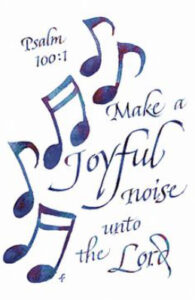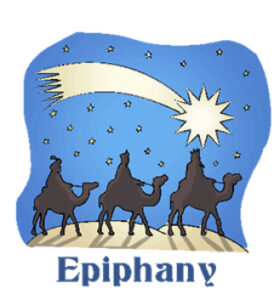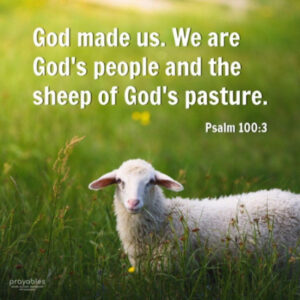Canon Rob's Reflections
A Song of Joy and Praise
A Reflection on Psalm 100 by Canon Rob
4th January 2026, for The Epiphany
 The Feast of the Epiphany is on 6th January, but the Church’s Calendar gives us the choice to celebrate it today, the Sunday before. So, choosing to do so, the psalm set for today is 100 and what an encouraging psalm to reflect upon near the beginning of this New Year! It may be that your Christmas has not been a happy occasion. Or that, as you read this reflection, you are feeling anxious or worried for the future. If either of these is appropriate for you, I pray that you will, at least, find some hope in the words of this psalm. For it is positive and encouraging and one for which we can be truly grateful. In his book, “The Psalms in the Life of God’s People, Dermot Cox has written about our praise of God in these words: “The Old Testament is the expression in words of what God meant to Israel….Thus praise is the most characteristic mode of existence for the community and the most human of attitudes.” In Hebrew the Book of Psalms is called “Praises” and Dermot Cox may be right although I wonder if praising God is not always as simple and easy as he may be suggesting. However, as you reflect upon the words of this short psalm, you will find in them encouragement and hope.
The Feast of the Epiphany is on 6th January, but the Church’s Calendar gives us the choice to celebrate it today, the Sunday before. So, choosing to do so, the psalm set for today is 100 and what an encouraging psalm to reflect upon near the beginning of this New Year! It may be that your Christmas has not been a happy occasion. Or that, as you read this reflection, you are feeling anxious or worried for the future. If either of these is appropriate for you, I pray that you will, at least, find some hope in the words of this psalm. For it is positive and encouraging and one for which we can be truly grateful. In his book, “The Psalms in the Life of God’s People, Dermot Cox has written about our praise of God in these words: “The Old Testament is the expression in words of what God meant to Israel….Thus praise is the most characteristic mode of existence for the community and the most human of attitudes.” In Hebrew the Book of Psalms is called “Praises” and Dermot Cox may be right although I wonder if praising God is not always as simple and easy as he may be suggesting. However, as you reflect upon the words of this short psalm, you will find in them encouragement and hope.
Like the opening verse of Psalm 95, today’s psalm is a call to worship. As Malcolm says about Psalm 100 in his beautiful book, “David’s Crown,” “Love bids us welcome with them to the feast…Calls us together in a great thanksgiving…” Imagine yourself standing outside the Temple in Jerusalem, or perhaps a church or cathedral which you love visiting, and the priest is at the door welcoming you with the words of verse 3: “Enter his [God’s] gates with thanksgiving and his courts with praise; give thanks to him and bless his name.” Or, if you attended and enjoyed one of the recent Christmas Services, remember the happy atmosphere and the pleasure you experienced as you joined others celebrating the birth of Christ. Remember the Three Kings who travelled many miles to worship the Christ child and to offer him their gifts and, as you remember, ponder the first verse of today’s psalm. The author clearly wanted his readers to share his joy: “O be joyful in the Lord, all the earth; serve the Lord with gladness and come before his presence with a song.” Notice that this is a call to people all over the world and not just those who live in Jerusalem, or who are visiting the Holy City. The God we worship is Father of all, for He is the Creator of all and we all belong to Him. As St Augustine said: “God made us for Himself and our souls are restless until they find their rest in Him.” The psalm’s invitation to everyone recalls the hope of the prophet Isaiah that foreigners would join Israel in worship and the service of God so that they too may find real joy. [See Isaiah 56.6 and 7.] The Feast of the Epiphany reminds us that the Kings were foreigners. God has no favourites. He welcomes everyone into His presence and in this is true joy however we may be feeling.
celebrating the birth of Christ. Remember the Three Kings who travelled many miles to worship the Christ child and to offer him their gifts and, as you remember, ponder the first verse of today’s psalm. The author clearly wanted his readers to share his joy: “O be joyful in the Lord, all the earth; serve the Lord with gladness and come before his presence with a song.” Notice that this is a call to people all over the world and not just those who live in Jerusalem, or who are visiting the Holy City. The God we worship is Father of all, for He is the Creator of all and we all belong to Him. As St Augustine said: “God made us for Himself and our souls are restless until they find their rest in Him.” The psalm’s invitation to everyone recalls the hope of the prophet Isaiah that foreigners would join Israel in worship and the service of God so that they too may find real joy. [See Isaiah 56.6 and 7.] The Feast of the Epiphany reminds us that the Kings were foreigners. God has no favourites. He welcomes everyone into His presence and in this is true joy however we may be feeling.
 As if to drive this home, the author of Psalm 100 gives us an analogy which we find often in the Bible: that of the shepherd and his sheep. Verse 2 says, “Know that the Lord is God; it is he that has made us and we are his; we are his people and the sheep of his pasture.” As you reflect upon this verse, remember that Jesus spoke of himself as the Good Shepherd who cares for his sheep. In him we find safety [See John 10.14-18] and God will always care for us. He can do no other for it is His nature to love without limit. Or in the words of verse 4, “..the Lord is gracious: his steadfast love is everlasting, and his faithfulness endures from generation to generation.” These are no empty words: the psalmist knew only too well the sufferings of this world. But the confidence and hope found in today’s psalm is the result of his faith in God and His unconditional and eternal love.
As if to drive this home, the author of Psalm 100 gives us an analogy which we find often in the Bible: that of the shepherd and his sheep. Verse 2 says, “Know that the Lord is God; it is he that has made us and we are his; we are his people and the sheep of his pasture.” As you reflect upon this verse, remember that Jesus spoke of himself as the Good Shepherd who cares for his sheep. In him we find safety [See John 10.14-18] and God will always care for us. He can do no other for it is His nature to love without limit. Or in the words of verse 4, “..the Lord is gracious: his steadfast love is everlasting, and his faithfulness endures from generation to generation.” These are no empty words: the psalmist knew only too well the sufferings of this world. But the confidence and hope found in today’s psalm is the result of his faith in God and His unconditional and eternal love.
All people that on earth do dwell, sing to the Lord with cheerful voice;
him serve with fear, his praise forth tell, come ye before him and rejoice.
Hymn 21 in “Complete Anglican Hymns Old and New.”
Canon Rob’s Reflections on the Psalms
During 2026 the Reflections will based on one of the psalms set for the FIRST and THIRD Sundays of each month.
As usual they will be on this website and hard copies will available on the chest in church, including that for today.

